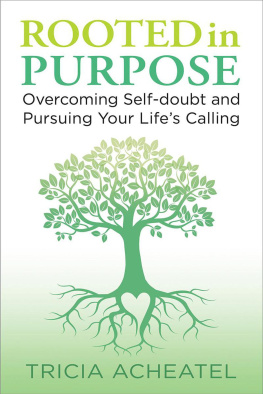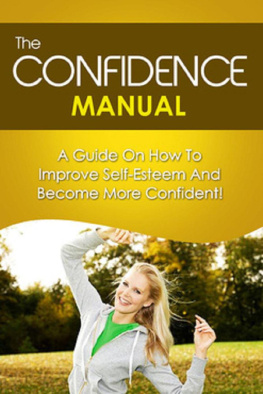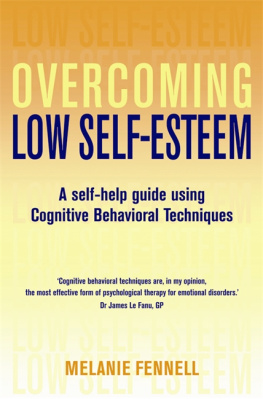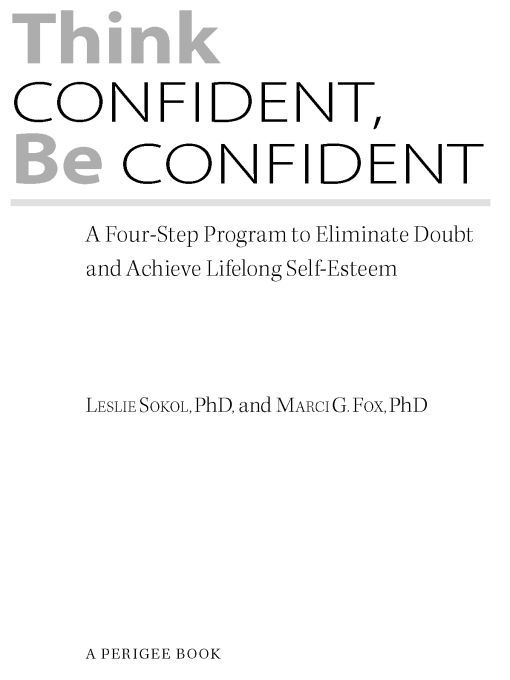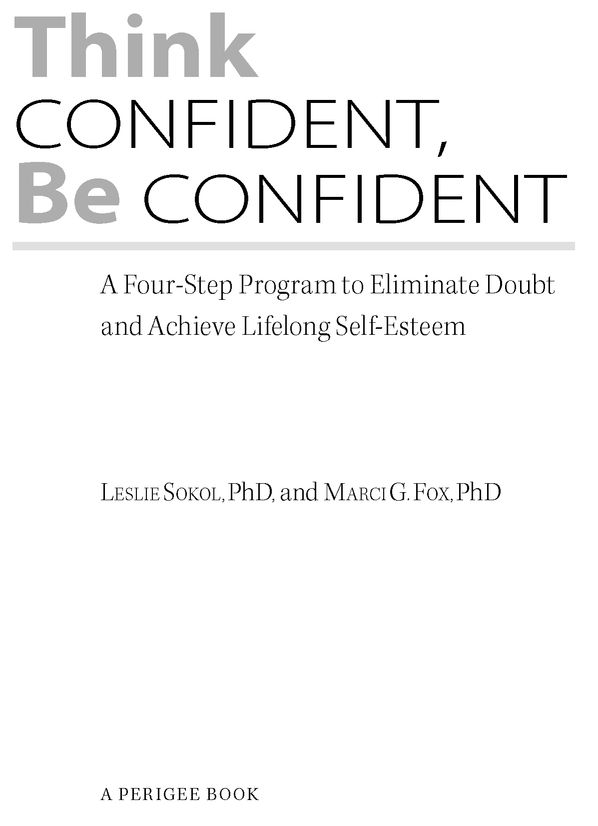Table of Contents
Praise for Think Confident, Be Confident
In Think Confident, Be Confident, Drs. Sokol and Fox, two experienced and top-notch clinicians, give the reader an unfailingly encouraging, optimistic message: You can become a more confident person. You can reduce the role that self-doubt plays in your life. You will learn how to think and act in ways that will improve your life, starting today. The books caring, upbeat message, combined with its many exercises derived from evidence-based cognitive therapy, will provide readers with valuable new psychological skills that endure.
Cory F. Newman, PhD, ABPP, Director of the Center for Cognitive Therapy
Think Confident, Be Confident by Leslie Sokol and Marci Fox is a clear-thinking, helpful guide to putting your self-doubts behind you so you can get ahead with your life. Filled with practical and easy-to-follow techniques, you will find yourself changing old patterns of thinking to feel like new again.
Robert L. Leahy, PhD, author of Anxiety Free
Drs. Sokol and Fox draw upon the science of cognitive therapy to help lift readers out of doubt. Think Confident, Be Confident shows you how to use moments of self-doubt as fertile ground to develop lasting self-confidence. Doubt you can do it? Think again.
Dennis Greenberger, PhD, and Christine A. Padesky, PhD, authors of Mind Over Mood
Drs. Sokol and Fox provide a clear path from doubt to confidence, based on tried and true cognitive strategies that have been used for decades to transform negative thinking into realistic thinking. Think Confident, Be Confident is well written and the approach taken is straightforward and practical. This book will provide much-needed relief to those who struggle with unnecessary doubt!
Martin M. Antony, PhD, ABPP, author of The Anti-Anxiety Workbook
Although doubt can have several positive forms (rational skepticism; reasonable doubt in criminal cases), doubt can also undermine self-esteem, cripple effective decision-making, and in the extreme lead to anxiety and/or depression. Think Confident, Be Confident discusses the clinical aspects of doubt. Written by world-leading experts in cognitive therapy, but at an easily accessible level, this book is a definitive source for assessment and intervention with doubt. My prediction is that Think Confident, Be Confident will serve as the sourcebook in this area, and is recommended to anyone who works with patients who experience pathological or clinical doubt.
Keith S. Dobson, PhD, President of the Academy of Cognitive Therapy
Dedicated to Aaron T. Beck, MD, and Judith S. Beck, PhD,
champions of cognitive therapy
FOREWORD
Self-doubt is part of the human condition, but in excess, it undermines individuals confidence and interferes with their ability to set and work toward goals that are important to them: in productive activities (such as work, home management, sports, leisure pursuits) and in relationships (platonic and romantic, with friends, family, neighbors, and coworkers). Self-doubt inhibits affirmative action and leads to unnecessary distress, suffering, and avoidance.
Fortunately, Think Confident, Be Confident provides a solution to the problem. It was written by two of our associates, who have been with us for many years. Dr. Sokol is the director of education for the Beck Institute for Cognitive Therapy and Research and Dr. Fox is a senior faculty member in our Extramural Training Program. They have made incalculable contributions to the field of cognitive therapy in the past twenty-five years through clinical care and teaching and supervising thousands of clinicians worldwide. Drs. Sokol and Fox provide answers to two essential questions: Why do people have self-doubt? What can they do to improve their lives? They explain the origins of self-doubt, differentiate between realistic concern (which can be helpful) and excessive doubt (which can cripple ones ability to take important action). Then they spell out how to use cognitive therapy techniques to quell unwarranted self-doubt and increase self-confidence.
Cognitive therapy, a time-limited form of talk therapy, has been shown to be remarkably effective in helping people with their psychological problems. One important strategy is learning how to respond to unrealistic thinking. When individuals are plagued with self-doubt, they often have inaccurate ideas about themselves (Im incompetent; Im unlovable) and they negatively predict others reactions or misperceive how others are viewing them (He thought I did a poor job; She wont want to see me again).
But changing ones thinking is not enough. Think Confident, Be Confident also guides readers in how to change their behavior so they can begin to take reasonable social-, work-, or productivity-related actions they have been avoiding, believing their shortcomings would be exposed. It also helps readers recognize their accomplishments when they do take action, teaching them to give themselves credit instead of engaging in second-guessing and self-criticism.
Think Confident, Be Confident offers a unique, interactive four-step program. The authors have used their considerable clinical experience and expertise to develop practical, effective, problem-solving strategies. In Step 1, Label It, readers recognize and label their self-doubts. In Step 2, Question It, readers learn to examine the validity of their doubt. Step 3, Rethink It, helps readers replace their doubt-driven rules and strategies with more productive ones and create more accurate beliefs about the self. In Step 4, Take Action, readers learn to think and behave more effectively so they can reach their goals.
This book is an invaluable guide to both consumers and the professionals who treat them. It will reduce unwarranted self-doubt, increase self-confidence, andmost importantallow individuals to achieve their goals.
Judith S. Beck, PhD
Director, Beck Institute for Cognitive Therapy and Research
Clinical Associate Professor of Psychology in Psychiatry
University of Pennsylvania
Aaron T. Beck, MD
University Professor Emeritus of Psychiatry
University of Pennsylvania
President, Beck Institute for Cognitive Therapy and Research
INTRODUCTION
Imagine that you have made plans to meet friends at a restaurant. You arrive to find them at the bar engrossed in their conversations. You would like to rush over and say hello, but you dont. Instead you slowly approach the group and wait quietly for someone to ask you to join in.
Envision this work situation: You are about to address a meeting of your sales team. The agenda is a newly created project of yours, one in which you passionately believe. You look around at your team members and suddenly lose focus. Your plan of action feels as if it were riddled with holes. In your mind, you highlight the few negative comments coworkers have made to you about getting this project off the ground, and you forget about all the positive feedback you have received.
Think about an upcoming tennis match. Rather than being able to concentrate or have fun, you become fixated on your opponents lightning-fast serve. Instead of being in the moment, using your well-practiced stroke and reflexes to effectively return those serves, you choke.


